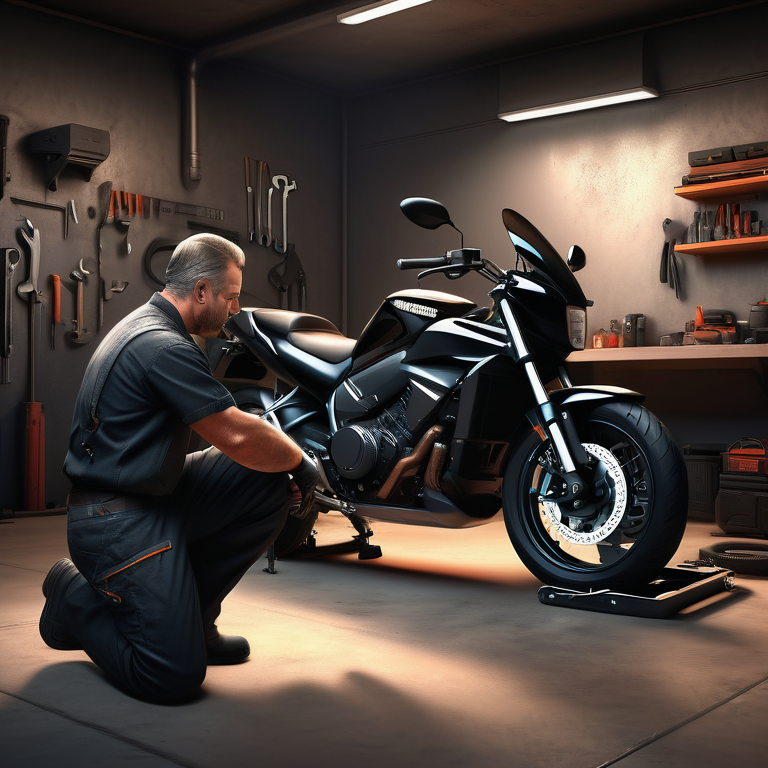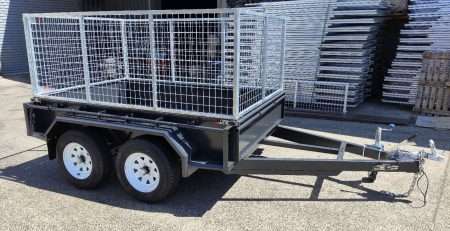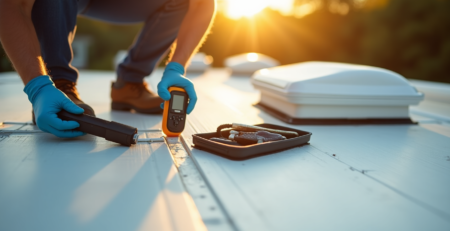
Easy Motorcycle Trailer Hitch Installation Guide
Key Highlights
- Choosing the right motorcycle trailer hitch is important for safety and convenience.
- Understanding the different types of motorcycle hitches will help you make an informed decision.
- Compatibility with your motorcycle model is crucial to ensuring a proper fit.
- Preparing for installation involves gathering the necessary tools and accessories.
- The step-by-step installation process will guide you through attaching the hitch to your motorcycle and securing it properly.
- Wiring your trailer hitch is essential for connecting the electrical components.
Introduction
When it comes to transporting your motorcycle, a trailer hitch is a convenient accessory that provides you with the flexibility to tow your bike behind your vehicle. Whether you’re going on a road trip or need to transport your motorcycle to a different location, a trailer hitch allows you to do so safely and securely.
Installing a motorcycle trailer hitch may seem like a daunting task, but with the right guidance and tools, it can be a relatively easy process. This blog will provide you with a step-by-step guide on how to install a motorcycle trailer hitch, from choosing the right hitch for your bike to wiring it properly. Follow these instructions to install a trailer hitch on your motorcycle and enjoy the convenience it offers.
Before we delve into the installation process, let’s first highlight the key points that we’ll be covering in this blog. Understanding these key highlights will give you a better idea of what to expect from the installation process and help you make informed decisions throughout. So, let’s get started!
Choosing the Correct Motorcycle Trailer Hitch
Choosing the right motorcycle trailer hitch is crucial to ensuring a safe and secure towing experience. There are different types of hitches available on the market, each with its own features and benefits. For Harley-Davidson riders, the Banner Hitch is a popular choice. It offers strength and load ratings in a unique design that allows you to remove the ball mount, making the hitch virtually invisible.
Another option to consider is a swivel hitch, which allows your trailer to remain upright while your motorcycle leans into curves. The USA Trailer Store offers a wide range of trailer hitches for motorcycles, so you can find the perfect fit for your bike.
Understanding Different Types of Motorcycle Hitches
When it comes to motorcycle hitches, there are several different types to choose from. One popular option is the swivel hitch, which allows your trailer to remain upright while your motorcycle leans into curves. This type of hitch is especially beneficial for riders who enjoy taking tight corners and want to maintain stability while towing.
Another type of motorcycle hitch is the Black Widow hitch, which is known for its heavy-duty steel construction and durability. The Black Widow hitch securely attaches your trailer to your motorcycle, ensuring a safe and stable towing experience.
There are also specific hitches available for trike models if you ride one. The unique design and weight distribution of trikes accommodate these hitches, ensuring a proper fit and a safe towing experience.
Understanding the different types of motorcycle hitches allows you to choose the one that best suits your needs and preferences.
Compatibility with Your Motorcycle Model
When choosing a motorcycle trailer hitch, it’s important to consider its compatibility with your specific motorcycle model. Towing requirements vary among different motorcycles, necessitating the selection of a hitch specifically tailored for your bike.
Owners of Harley-Davidson motorcycles have access to hitches specifically designed to fit their models. Engineers engineered these hitches to accommodate the unique design and weight distribution of Harley motorcycles, ensuring a proper fit and a safe towing experience.
There are hitches designed specifically for Honda and other motorcycle brands. It’s important to choose a hitch that is compatible with your specific motorcycle to ensure a secure and stable towing experience.
There are hitches specifically designed to accommodate the unique design and weight distribution of trikes for those who ride them. These hitches provide a secure and stable towing experience for trike owners.
By choosing a hitch that is compatible with your motorcycle model, you can ensure a proper fit and a safe towing experience.
Preparing for Installation
Before you begin the installation process, it’s important to gather all the necessary tools and accessories. This will ensure that you have everything you need to complete the installation smoothly and efficiently.
Some of the tools you may need include a wrench, a socket set, a drill, and a screwdriver. You will use these tools to remove any existing hardware and install the new hitch.
In addition to tools, you may also need accessories such as a wiring harness and trailer connectors. These accessories are important for connecting the electrical components of your trailer to your motorcycle’s electrical system.
By gathering all the necessary tools and accessories before you start the installation process, you can ensure a seamless and hassle-free experience.
Tools and materials you will need
- Wrench
- Socket set
- Drill
- Screwdriver
- Wiring harness
- Trailer connectors
Throughout the installation process, you will use these tools and materials to remove the existing hardware, install the new hitch, and connect the electrical components of your trailer. It’s important to have all these tools and materials on hand before you start the installation to ensure a smooth and efficient process.
When gathering these tools and materials, it’s a good idea to check if there are any specific requirements or recommendations from the manufacturer of your hitch. This will help ensure that you have everything you need for a successful installation.
It’s also worth noting that some online retailers, such as the USA Trailer Store, offer free shipping on their products. This can be a convenient and cost-effective option for purchasing your motorcycle trailer hitch and accessories.
Safety precautions before starting
Before you start the installation process, it’s important to take some safety precautions to ensure a safe and successful installation. Here are some important safety tips to keep in mind:
- Make sure your motorcycle is secure and stable before starting the installation. To prevent the bike from tipping over, use a motorcycle stand or have someone hold it.
- Wear appropriate safety gear, including gloves and safety glasses, to protect yourself from any potential hazards during the installation process.
- Read and follow the manufacturer’s instructions carefully. This will help ensure that you install the hitch correctly and avoid any potential issues or accidents.
- Take your time and double-check your work at each step of the installation process. This will guarantee the correct and secure installation of everything.
By adhering to these safety precautions, you can reduce the risk of accidents and ensure a safe installation process.
Step-by-step installation process
Now that you have gathered all the necessary tools and materials and taken the necessary safety precautions, it’s time to begin the installation process. Follow these step-by-step instructions to install your motorcycle trailer hitch:
- Start by removing any existing hardware or components that may interfere with the installation of the hitch.
- Install the hitch according to the manufacturer’s instructions. This may involve drilling holes in your motorcycle frame and securing the hitch with bolts.
- After installing the hitch securely, double-check all the connections to ensure proper tightening.
- Test the hitch’s stability by gently rocking it back and forth. If there is any movement, tighten the bolts further.
By following these step-by-step instructions, you can ensure a successful installation of your motorcycle trailer hitch.
Attaching the Hitch to Your Motorcycle
To attach the hitch to your motorcycle, follow these steps:
- Position the hitch on your motorcycle frame in the correct place. The hitch should align with the existing holes or mounting points on your frame.
- Secure the hitch to your motorcycle frame using the bolts provided. Make sure to tighten the bolts securely to ensure a stable and secure attachment.
- Verify the tightness of all the connections. Test the hitch’s stability by gently rocking it back and forth. If there is any movement, tighten the bolts further.
- After securing the hitch, you can move on to the next installation step.
By following these steps, you can ensure that the hitch is properly and securely attached to your motorcycle.
Securing the hook and testing stability
After attaching the hitch to your motorcycle, it’s important to secure it properly and test its stability. Follow these steps to ensure a secure and stable hitch:
- Use the tie-down straps or other accessories provided. Ensure the hitch aligns properly with your motorcycle’s frame and the straps are tight and secure.
- Test the hitch’s stability by gently rocking it back and forth. If there is any movement or instability, double-check the attachments and tighten them further if necessary.
- Once the hitch is secure and stable, you can proceed to the next step of the installation process.
By securing the hitch properly and testing its stability, you can ensure a safe and reliable towing experience.
Wiring Your Trailer Hitch
Wiring your trailer hitch is an important step in the installation process. It enables you to connect your trailer’s electrical components to your motorcycle’s electrical system. Follow these steps to wire your trailer hitch:
- Gather the necessary wiring harness and trailer connectors. These accessories are essential for connecting the electrical components.
- Follow the manufacturer’s instructions to connect the wiring harness to your motorcycle’s electrical system. This may involve removing a panel or accessing the electrical wiring.
- After connecting the wiring harness, connect the electrical components of your trailer to it using the trailer connectors.
By properly wiring your trailer hitch, you can ensure that your trailer’s electrical components function correctly and safely.
Connecting the wiring harness
To connect the wiring harness to your motorcycle’s electrical system, follow these steps:
- Locate the wiring harness connector on your motorcycle. This connector is typically located near the rear of the bike, under the seat, or behind a side panel.
- Disconnect the wiring harness connector by carefully removing any clips or connectors that may be holding it in place.
- Connect the wiring harness connector to the corresponding connection on your motorcycle. Ensure proper alignment and secure connection of the connectors.
- Secure any loose wires or connectors after connecting the wiring harness to keep them from coming loose during use.
By following these steps, you can ensure a secure and reliable connection between the wiring harness and your motorcycle’s electrical system.
Ensuring electrical connections are secure
After connecting the wiring harness to your motorcycle’s electrical system, it’s important to ensure that all electrical connections are secure. Here are some steps to follow:
- Double-check all the electrical connections to make sure they are properly aligned and securely connected. Ensure that there are no loose wires or connectors.
- Test the electrical components of your trailer to ensure they are functioning correctly. This may involve connecting the trailer to your motorcycle and testing the lights and other electrical features.
- If you notice any issues or problems with the electrical connections, double-check the wiring harness and connectors. Make sure they are properly connected and secure.
By ensuring that all electrical connections are secure, you can ensure the safe and reliable operation of your trailer’s electrical components.
Tips for Easy Maintenance
Proper maintenance of your motorcycle trailer hitch is important to ensure its longevity and optimal performance. Here are some tips for easy maintenance:
- Regularly inspect and tighten your hitch’s bolts and connections. This will help prevent any loose or worn parts that could affect its stability.
- Lubricate the moving parts of your hitch, such as the ball mount, to ensure smooth operation. Use a high-quality lubricant that is appropriate for your hitch.
- If you ride a Freewheeler or other trike model, pay special attention to the maintenance and lubrication requirements specific to your trike hitch.
By following these simple maintenance tips, you can prolong the life of your motorcycle trailer hitch and ensure trouble-free towing.
Bolts are regularly inspected and tightened.
Regularly inspecting and tightening the bolts of your motorcycle trailer hitch is important to maintain its stability and safety. Here are some steps to follow:
- Periodically inspect all the bolts and connections of your hitch to ensure they are tight and secure. Look for any signs of wear or damage.
- Use a wrench or socket set to tighten any loose bolts or connections. Make sure to tighten them securely, but be careful not to overtighten them.
- If you ride a Harley-Davidson FLTRX or FLTRUSE model, pay special attention to the hitch and its bolts, as these models may have specific requirements for inspection and tightening.
By regularly inspecting and tightening the bolts on your motorcycle trailer hitch, you can ensure its stability and safety during towing.
Lubricating moving parts
Lubricating the moving parts of your motorcycle trailer hitch is important to ensure its smooth operation. Here are some tips for lubricating the moving parts:
- Use a high-quality lubricant that is appropriate for your hitch. Apply the lubricant to the moving parts, such as the ball mount, according to the manufacturer’s instructions.
- Make sure to clean up any dirt or debris from the moving parts before applying the lubricant. This will help prevent any buildup or damage to the hitch.
- If you ride a Harley-Davidson FLHTK or FLHR model, pay special attention to the lubrication requirements specific to your hitch.
Regularly lubricating the moving parts of your motorcycle trailer hitch can ensure its smooth operation and prevent any issues or damage.
Conclusion
To wrap up, mastering the installation of a motorcycle trailer hitch entails selecting the right hitch, ensuring compatibility with your bike, and following safety precautions. The step-by-step process and maintenance tips are crucial for a seamless hitch experience. Whether you choose to DIY or seek professional help, regular inspection and maintenance play a key role in the hitch’s longevity. Understanding your motorcycle’s capabilities and limitations will enhance your towing experience. Stay informed about safety concerns and different hitch types to make an informed decision tailored to your needs. Happy and safe riding!
Frequently Asked Questions
Can I install a trailer hitch on my own?
Yes, you can install a trailer hitch by yourself. With the right tools and instructions, it’s a relatively straightforward process. However, if you’re not comfortable with DIY projects, it’s always a good idea to seek professional help.
How do I choose the right trailer for my hitch?
When choosing a trailer for your hitch, consider factors such as its weight capacity, size, and compatibility with your hitch. The USA Trailer Store offers a wide range of trailers, including swivel hitches, that are compatible with various motorcycle hitch models.
Can you hitch a trailer to a motorcycle?
Yes, you can hitch a trailer to a motorcycle. By installing a trailer hitch and following proper towing procedures, you can safely tow a trailer with your motorcycle. However, it’s important to consider your motorcycle’s weight capacity and choose a trailer that’s suitable for its towing capabilities.
Are motorcycle tow hitches safe?
Yes, motorcycle tow hitches are safe when installed and used correctly. They serve the purpose of securing a trailer to your motorcycle and ensuring stability while towing. However, it’s important to follow proper safety guidelines and ensure that your motorcycle is capable of safely towing the trailer.
Can a motorcycle pull a bike trailer?
Yes, a motorcycle can pull a bike trailer, as long as the motorcycle’s towing capacity is suitable for the weight of the trailer. To ensure safe and efficient towing, it’s important to consider your motorcycle’s towing capacity and choose a trailer that is within its limits.
How do you haul a motorcycle without a hitch?
If you don’t have a hitch, there are alternative options for hauling a motorcycle. You can use motorcycle hitch carriers or motorcycle trailers that attach to your vehicle’s rear bumper or trunk. These accessories provide a secure and convenient way to transport your motorcycle without a hitch.
How do you decide which motorcycle trailer and hitch is best for your bike?
To choose the right motorcycle trailer and hitch for your bike, consider factors such as the weight capacity of the trailer, its compatibility with your motorcycle model, and the features and accessories offered by the hitch. It’s also important to ensure that the hitch and trailer are suitable for your intended use and towing needs.
Are there any safety concerns to consider when using a motorcycle trailer and hitch?
Yes, there are some safety concerns to consider when using a motorcycle trailer and hitch. Make sure to install and secure the hitch properly, adhere to the correct towing procedures, and take into account your motorcycle’s weight capacity and towing capabilities. It’s also important to regularly inspect and maintain the trailer and hitch to ensure their safe and reliable operation.
Are there different motorcycle hitches, and how do they differ?
Yes, there are different types of hitches available for motorcycles, each with its own features and benefits. Some of the common types include swivel hitches, Black Widow hitches, and hitches designed specifically for trikes. These hitches differ in terms of their design, load capacity, and compatibility with different motorcycle models.
Can a motorcycle trailer and hitch impact your bike’s handling?
Yes, a motorcycle trailer and hitch can affect the handling of your bike, particularly when cornering or manoeuvring at high speeds. The trailer’s added weight and length can affect the balance and stability of the motorcycle, so it’s important to adjust your riding style and be cautious when towing a trailer.
Do I need a swivel hitch for my motorcycle trailer?
A swivel hitch is not necessarily required for every motorcycle trailer, but it can provide additional stability and safety, especially when towing heavy or larger trailers. The swivel design allows the trailer to remain upright while the motorcycle leans into curves, minimising the risk of instability or jackknifing.
Are motorcycle hitch-carriers reliable?
Yes, motorcycle hitch carriers are reliable when installed and used correctly. The design secures your motorcycle to your vehicle’s hitch, offering a stable and safe transportation solution. However, it’s important to choose a high-quality hitch carrier and follow proper safety guidelines to ensure reliability and durability.
Author
I am Rahatul Ashiq Tamal. Another author of Muscle Trailers. Muscle Trailers is a well-known trailer brand in Sydney, Melbourne & Adelaide

How to Mount a Spare Tire on Your Trailer: A Simple Step-by-Step Guide
Trailer service centers receive over 1 million phone calls and 1.3 million emails each year about trailer maintenance problems....

How to Fix RV Roof Leaks: Simple Roof Leak Detection Guide for Beginners
Did you know DIY RV roof repairs can cost under $50? But undetected leaks could lead to substantially higher repair...

Starting a Food Truck Business in Australia: From Trailer Selection to Launch
The Australian mobile food market has evolved into a billion-dollar industry. This makes a food truck...
